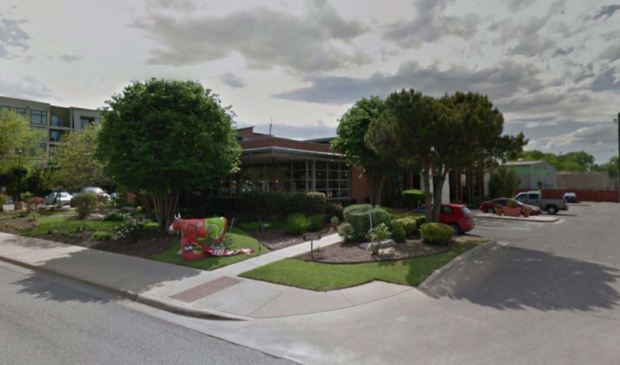Schlotzsky’s PUD wins first round approval
Monday, September 21, 2020 by
Jo Clifton City Council voted 7-4 on first reading last week to approve zoning that would allow a 96-foot tower on the property at 218 S. Lamar, the home of a closed Schlotzsky’s restaurant. Leading the dissent was District 5 Council Member Ann Kitchen, whose district includes the property. Joining her in rejecting the zoning change from General Commercial Services – Vertical Mixed Use (CS-V) to Planned Unit Development (PUD) were Council members Kathie Tovo, Alison Alter and Leslie Pool.
The property sits on the west side of South Lamar and Toomey Road, immediately east of the Zach Theater and the offices of the Parks and Recreation Department. Most of the properties along this part of South Lamar are zoned to limit the building height to 60 feet. However, in 2019, Council approved a 96-foot height for the property across the street (unofficially known as the Taco PUD because it took over the site of a former Taco Cabana). At that time, the developers had proposed some housing on the site, but that has since changed.
Kitchen had a number of concerns relating to the eligibility and the applicability of using a PUD for this location. Planned unit developments are intended for properties of more than 10 acres, but have been used on several other occasions when Council deemed the plan to be superior. But Kitchen said the plan before them was not superior and she was particularly concerned that there was no housing component. In addition, she said the plan did not comply with the city’s waterfront overlay.
Developers propose to pay a fee in lieu of providing affordable housing to the Neighborhood Housing and Community Development Department, but both Kitchen and Tovo criticized the proposed payment of less than $2 million as inadequate. Tovo pointed out that the developers of the 211 South Lamar PUD would be contributing a total of $3.7 million for affordable housing.
Amanda Swor with Drenner Group, who represented the applicant, told Council the project received “overwhelming support” from the Environmental Commission and was not asking for any environmental variances. The plan for the project includes building to earn a three-star rating in the Austin Energy Green Building Program, and street yard landscaping in excess of code requirements by 35 percent, according to a staff analysis.
Swor also tried to explain why the site, sitting on a major transportation corridor, would not be a good place for housing. She said the site “doesn’t have the complete set of uses for what the corridor is looking to be. … You have housing, but you have no feet on the street during the day. … The only thing that’s surviving are restaurants that have a drive-thru.” That did not seem to satisfy Kitchen, Alter or Tovo.
Despite approval from the Planning Commission and the Environmental Commission, several neighborhood groups voiced opposition. Those included the South River City Citizens, who said in a letter to Council that the project does not meet standards set by the waterfront overlay ordinance, which “was enacted to preserve views and public use of land along the river.”
The Zilker Neighborhood Association and the Austin Neighborhoods Council also wrote letters opposing the zoning change. They criticized the project for its appearance – a PUD building with a significant amount of glass – as well as its height and the traffic patterns it will create.
The applicant has proposed all parking to be underground, including excess spaces that would be useful for the redesigned Dougherty Arts Center as well as the Zach and the parks department. However, the developer was not proposing making that parking free – most people parking there would be required to pay a fee.
Kitchen asked Steve Drenner, who was also representing the applicant, whether his client was willing to negotiate on the parking as well as additional affordable housing contributions. Drenner told her, “Of course, we’re willing to discuss anything.”
The Austin Monitor’s work is made possible by donations from the community. Though our reporting covers donors from time to time, we are careful to keep business and editorial efforts separate while maintaining transparency. A complete list of donors is available here, and our code of ethics is explained here.
You're a community leader
And we’re honored you look to us for serious, in-depth news. You know a strong community needs local and dedicated watchdog reporting. We’re here for you and that won’t change. Now will you take the powerful next step and support our nonprofit news organization?









